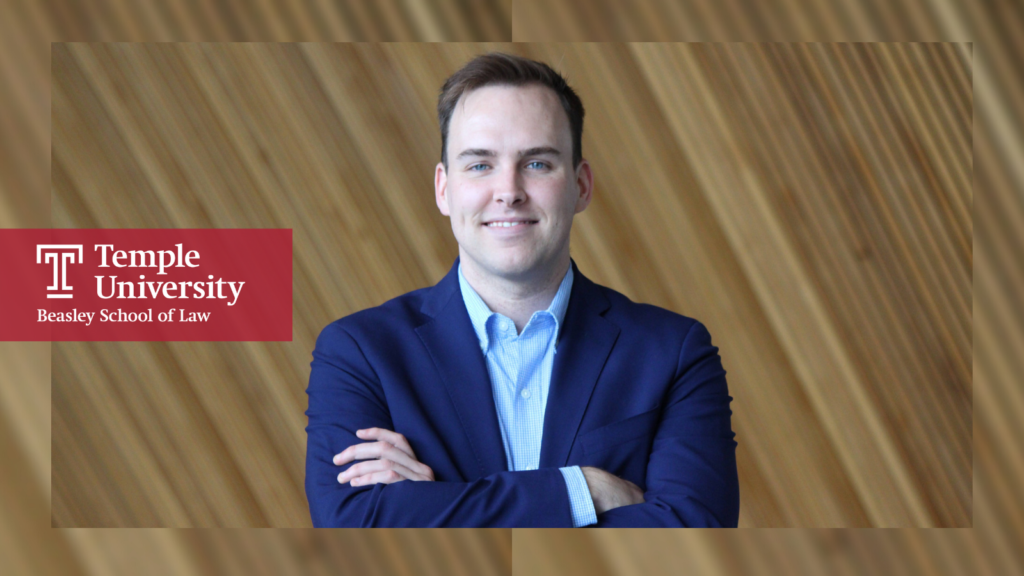
Hometown: West Chester, PA
Education:
- Penn State, 2015 | Management Information Systems
Job: United States Navy, Judge Advocate
Program: Full-Time Day
Law School Motivation
I had a pretty unconventional path to law school being a warehouse shift manager for four years after college. It was a humbling experience as it taught me how to work with differing motivations within a team. However, it was not as impactful of a role as I was hoping. Somewhat ironically, I was listening to a podcast at the time called The History of Rome. It talked about many Roman leaders who had studied law. Among other reasons, that piqued my interest, and I started applying. Predictably though, many of the skills did not really translate to law school. With that said, the work environment gave me a great appreciation for learning and continuous improvement in general. Coming into law school, I knew I wanted to do something in public service so I could have that greater impact. That is what I am hoping to carry into my career with the Navy JAG Corps.
Experiential Learning
I took part in practicums with the U.S. Department of Labor during three semesters. Two were with the Office of the Solicitor, and one was with the Office of Administrative Law Judges. I cannot recommend practicums and other experiential programs enough. There were so many valuable aspects that students just do not get in the classroom. While mine were remote because of COVID, I was still able to experience a professional setting and made connections that ultimately helped me to land my job. On top of that though, I improved my research and writing skills, learned how to interact with judges in a formal setting, and received first-hand experience in the different stages of litigation. Doing the work that lawyers actually do also gave me the confidence to know that I can excel in the future.
Faculty Impact
There were so many influential professors to name, but a few specifically come to mind. First, I appreciated how Professor Morrow taught our 1L Legal Research and Writing course, and it gave me the tools to succeed in many of the classes I took after that. He continued to give me invaluable advice even after the class was over. Professor Shellenberger’s Criminal Procedure II class and Advanced Trial Advocacy with Judge Restrepo were both instrumental in fostering my interest in criminal law. The practical nature of those classes both gave me confidence in my skills and showed me where I also have opportunities to continue learning. Finally, I have to give a big shout-out to Professor Lee, who was my supervisor for each semester of my practicums. It was valuable to have someone I could go to outside of the organization to be able to discuss certain issues that I was having.
The Temple Law Difference
I learned a ton of skills in my trial advocacy classes that I hope to use in my career as a litigator. While the big skills such as presentation and structuring an argument are key, what really cemented it for me were the seemingly smaller things that not everyone is taught. How to put together an evidence binder, exactly what to say when trying to get it admitted, and just the real-world experiences of the instructors I had were the types of lessons that I hope will translate as I start practicing.
Advice from a Temple Law Grad
My two pieces of advice are to treat law school like a job, and use this time in school to find and demonstrate your interests. My cousin gave me the first shortly before I started 1L year, and it helped change my mindset. Law school has been so much different and more challenging for me than my other education, so understanding the time and dedication I needed to put toward it helped set me on the right path. As for the second piece, I was lucky to at least know that I wanted to do something in public service, so I looked for and took those types of opportunities. Those experiences ultimately helped me demonstrate that interest and helped me to earn my job.
Finding Balance
I would be the first to admit that I was not great at balance, especially my first year. In that way though, the pandemic was a bit of a blessing in that it forced me to not spend all of my time at school. With that said, part of achieving the work/life balance aside from hobbies is making sure you take the right course mix. One of the best pieces of advice I received when scheduling my 2L fall semester was from Britt Walden, who said to make sure to balance my course load and not schedule all writing or all exam courses in the same semester. The classes you take should certainly depend on what your end goals are, but your course mix each semester will be a good predictor of the kind of work-life balance you will have as well.
